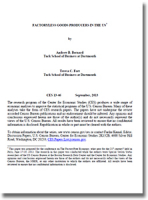Factoryless Goods Producers in the US
This paper documents the extent and characteristics of firms in the US that are outside the manufacturing sector according to official government statistics but nonetheless are involved in activities related to the production of manufactured goods.
The global economy has undergone a series of rapid, connected transformations in recent years that are changing the way we think about firms and sectors and that have potentially large consequences for future policy, productivity and prosperity.
International trade in goods has surged with the ratio of trade to GDP increasing for almost all exporter-importer country pairs.
This substantial increase in trade has been accompanied by the rise of the importance of global value networks and the fragmentation of production activities across national borders even within narrowly-defined goods categories.
At the same time, there has been renewed interest in the fragmentation of production activities across the boundaries of the firm and its links to the increases in trade and offshoring of production. The different activities of the value chain for a product can be performed by one or more establishments of a single firm, or can involve many different firms. In both cases, the activities can be performed in different locations within and across country borders.
However, to date, almost all analyses of these trends and their consequences for output, employment or productivity, either aggregate or firm-level, have focused on establishments and firms in the manufacturing sector and their decisions to outsource or offshore.
In this paper we consider an extreme form of the fragmentation of production activities where the establishment is outside the manufacturing sector according to official government statistics but nonetheless is heavily involved in activities related to the production of manufactured goods.
These establishments are found in the wholesale sector and are formally known as “factoryless-goods producers” (FGPs). Traditional wholesalers are primarily, or exclusively, involved in intermediating goods between producers and retailers/consumers.
Factoryless goods producers, in contrast, design the goods they sell and coordinate the production activities, either at the establishment itself or through the purchase of contract manufacturing services.
In other words, FGPs are manufacturinglike in that they perform many of the tasks and activities found in manufacturing establishments themselves.
What’s Related

Favorites





